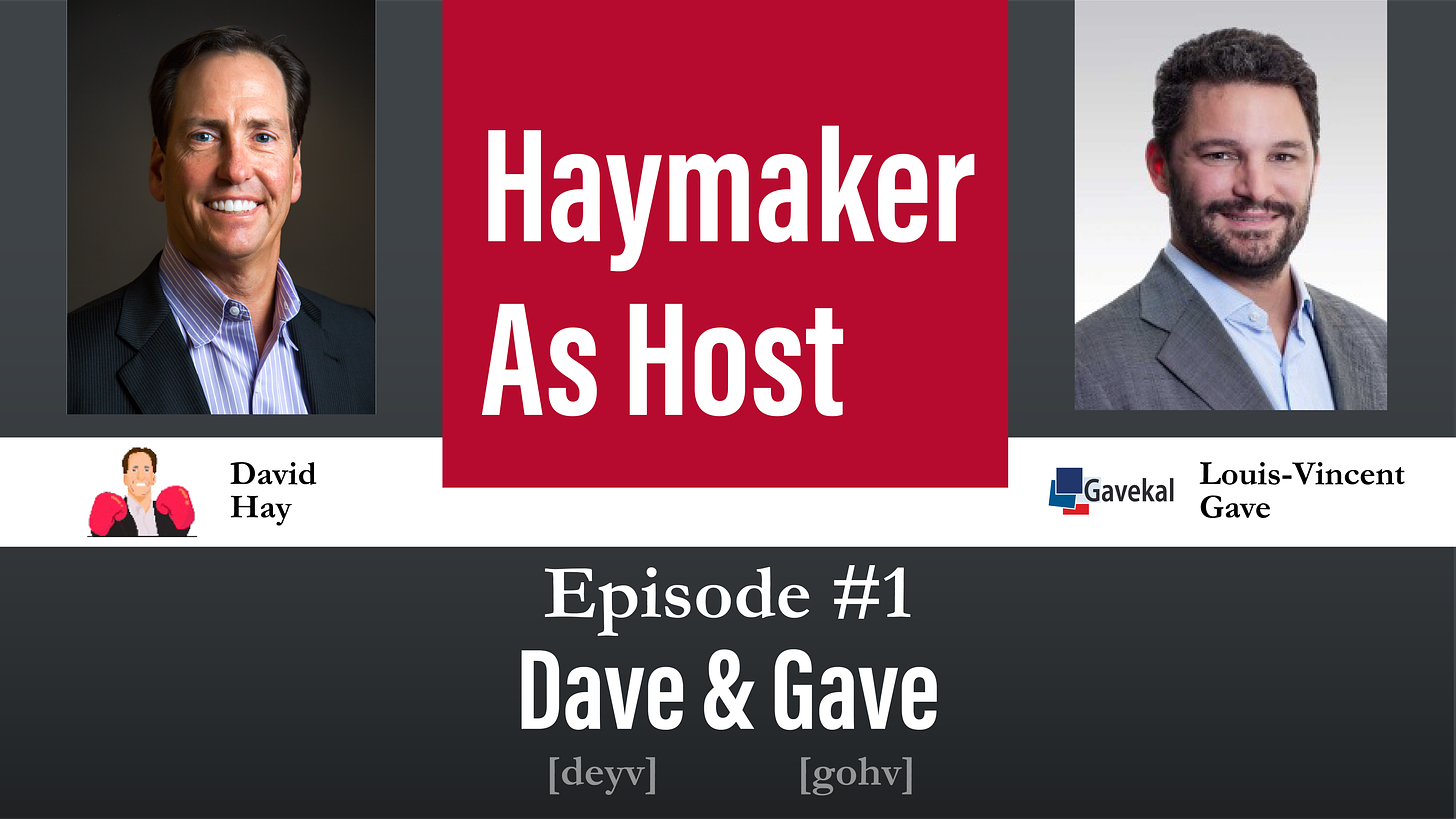“It is rare to find a business partner who is selfless. If you are lucky it happens once in a lifetime.” - Michael Eisner
My wife can always be counted on to speak candidly… especially to me. Yesterday, she watched a small snippet of this week’s video Haymaker and the first thing she said was: “Look at that halo around you. Are you trying to pretend you’re some kind of saint?”
Rather than any pretense toward religious nobleness, this was a function of the learning curve for our initial Haymaker production. The good news is that our first guest, Louis Gave, looked and sounded great. That’s particularly fortuitous since most of the content came from him.
It seemed to me appropriate to start our chat with the history of Gavekal’s early days in Hong Kong. Because that was back in the late 1990s, after the Asian Crisis had crashed asset prices, it is a tale of foresight and tenacity. When I say “crashed”, that’s no exaggeration. Home prices in the former British colony (the handover had just happened in 1997) vaporized by some 70%. Incredibly, not a single Hong Kong bank failed. (Louis ends the podcast with an amazing anecdote of a big bet his father and Gavekal co-founder, Charles Gave, made on the Asian stock market in the summer of 1998.)
Once Asia stabilized and China’s economic growth miracle resumed, the little Gavekal team, which numbered just four (including Louis’ golden retriever, Oshkosh), found themselves in the right place, at the right time. The investment world wanted to know what was going on in China and it figuratively beat a path to Gavekal’s door, as did many multinational corporations. It hasn’t stopped since, and today Gavekal is one of planet’s most prestigious macroeconomic research firms. It counts a long list of the most important money managers among its clients, and has been the subject of feature articles in many important publications, including Barron’s.
This is not to say, of course, that it is always right. In fact, I put Louis in a tough spot by asking him last week, right before Jay Powell’s now famous Jackson Hole speech, what he thought the Fed chairman would say the very next day. (We recorded on Thursday, August 25th, and Mr. Powell spoke on Friday the 26th). (You had it as Wednesday and Thursday - the interview took place last Thursday)
Louis felt he would try to avoid rattling the markets and that’s not how it turned out. It was my suspicion he might try to puncture the mini-bubble that had inflated since late June. However, I did note that the rapidly faltering U.S. economy might need a dovish speech, but the once-again frothy financial markets warranted the opposite. Mr. Powell obviously went with the latter, bringing this summer’s bear market rally to an abrupt conclusion. Louis did allow that if he were to come across as truly hawkish, stocks would suffer, and that’s certainly been the case.
In this free-flowing conversation, he weighs in on, among other key topics:
Ø The conflicting evidence on whether there is a global liquidity crisis underway.
Ø The likelihood of a U.S. recession.
Ø The Feds’ new stealth mandate (hint: it’s a lot like what the Bank of Japan has been unabashedly doing for years).
Ø Why Social Security is a Ponzi scheme.
Ø The European energy crisis (ironically, electricity prices over there have come down hard since our chat, though they remain excruciatingly high).
Ø The likely supply chain problems Europe will cause due to its energy debacle.
Ø His general rule that when governments are selling something, like oil right now, you want to be on the buy side.
Ø His observation that inflation is inflationary because it feeds on itself.
Ø The increasing de-dollarization of global trade.
To learn more about Evergreen Gavekal, where the Haymaker himself serves as Co-CIO, click below.
If you’ve never heard or seen Louis before, he’s a gifted speaker, with a knack for fun and relevant anecdotes. Moreover, I think he’ll eventually be proven right about the Fed and that another Powell Pivot is just a matter of time. Should he stay on the course of a double-tightening — aggressively raising rates and shrinking its balance sheet (finally!) — the already listing U.S. economy is likely to roll over in a big way. Frankly, I don’t see how this can continue for more than another six months, maybe less. But a lot of stock market pain can happen in the meantime, particularly given the spectacular dimensions of Bubble 3.0, to my mind the “WOAT” (“Worst Of All-Time”) financial mania.
Please be sure to “Like” this post and leave a comment before sharing it with others who might enjoy weekly Haymaker content. It helps us greatly as we continue battling away in the financial arena.
Now on to the interview…





Looking forward to these interviews David, thanks for the content
Terrific interview, thanks so much for undertaking this & sharing, greatly appreciated!